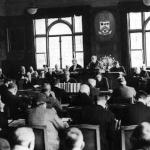A report published in Social Forces examines the ripple effects of divorce. Instead of individualistically tracking the effects of divorce on the divorced couple, examining the costs and benefits of divorce, or, at most on the rest of the family, the study summarizes a social network analysis of divorce: What happens to networks of friends when a couple gets divorced?
As the authors put it, “Divorce represents the dissolution of a social tie, but it is also possible that attitudes about divorce flow across social ties.”
A divorced couple can become a model encouraging their friends to get divorced: “people who get divorced promote divorce in others by demonstrating that it is personally beneficial (or at least tolerable) or by providing support that allows an individual to contemplate and endure a rupture in their primary relationship.” On the other hand, the opposite outcome is also possible: “people who get divorced inhibit divorce in others by demonstrating that it may be more personally costly than expected.”
The study finds that one of the factors that determines the likelihood of divorce is the strength of marriages in a couple’s social network: “Overall, the results suggest that attending to the health of one’s friends’ marriages may serve to support and enhance the durability of one’s own relationship, and that, from a policy perspective, divorce should be understood as a collective phenomenon that extends beyond those directly affected.”












